Podcast SEO is quite different from text-based SEO.
Recent changes in Google Search mean that podcasts are now being found in the search results. But despite that, building an audience for your audio content is different to building an audience for your written content.
Here are 5 things you need to know about podcast SEO to grow your audience in 2021.
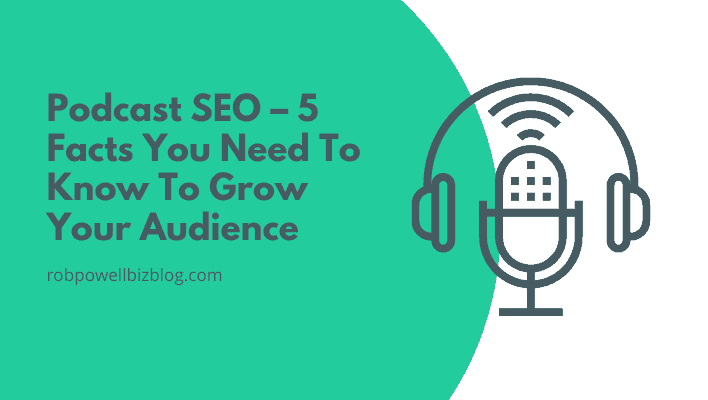
Until quite recently, the term ‘podcast SEO’ would have drawn a blank from many podcasters. Because podcasts were not considered to be an SEO asset.
But in August 2019 Google announced that it would start showing podcasts in the search results. And that was a game changer – up until then the only way you became aware that someone had a podcast was if you knew about them through text-based content (i.e. blog posts).
Podcasting has been around for a while – it took off in a big way in 2004. So why did it take search engines almost 15 years to start indexing podcasts?
There could be various reasons. But the development of Natural Language Processing (NLP) was likely a big factor.
Natural language processing is a branch of artificial intelligence that helps computers understand and interpret human language in both writing and the spoken word.
Recent advances in NLP mean that search engines can now parse verbal content in audio files. This has huge implications for podcasts and organic search, which I’ll come back to in a moment.
#1. How Does Podcasting Work?
Although most people have listened to plenty of podcasts not everyone is familiar with how podcasting works. Where do you actually upload podcasts? And how do people subscribe to them?
Here’s a brief overview of the mechanics of podcasting.
Podcasts are large MP3 files that would dwarf any of the usual content you find on a WordPress site. And that’s why people don’t serve podcasts from their own websites – it would chew up way too much bandwidth.
The solution is podcast hosting services.
These are like web hosts except that they specialize in storing and delivering large files. They’re able to handle a volume of bandwidth that would strain a normal
Podcast hosting services create an RSS feed for your podcast.
RSS (short for Really Simple Syndication) is a protocol that provides a web feed in a standardized, computer-readable format. RSS allows people to receive updates to web-based content from other websites.
For example, when you subscribe to a podcast in an app such as Stitcher or Pocket Casts, that’s done via RSS.
Podcast hosting services create an RSS feed for your podcasts so that other websites can subscribe to your podcasts. Of course, they do a lot more than that (e.g. providing analytics, web players, and scheduling tools).
But that’s a barebones explanation of what a podcast host does.
#2. Podcasting and Organic Search
While podcasting has been fantastic for building credibility and authority with your existing visitors, it hasn’t been a great way of pulling in new traffic.
What do I mean by that?
Well, people who listen to your podcast are people who found you through some other medium, most likely through your text-based content. They didn’t find you because of your podcast.
To put it another way, podcasting (up until now) has been about depth and not about reach.
But that’s all changing.
As we saw at the beginning of this article, podcasts are now showing up in the search results. You may have noticed that podcasts now get their own slider, just like videos:

With advances in AI and natural language processing (NLP) we can expect that search engines will start showing short audio excerpts from within a podcast as answers to search queries.
This is already happening with videos. In March 2020, Google started showing ‘key moments’ in videos:
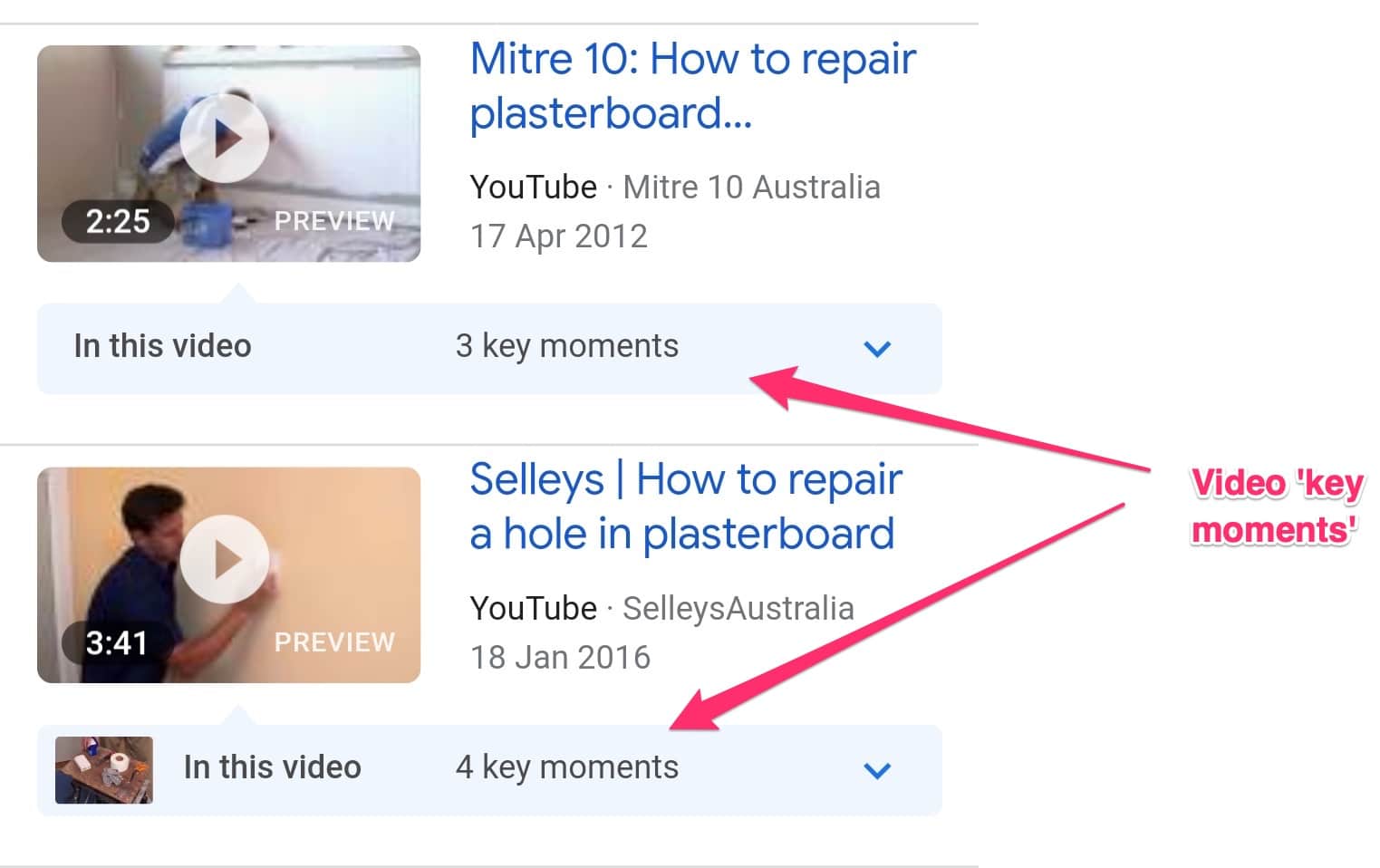
Each ‘key moment’ is a time stamped point in the video where the content answers the search query:
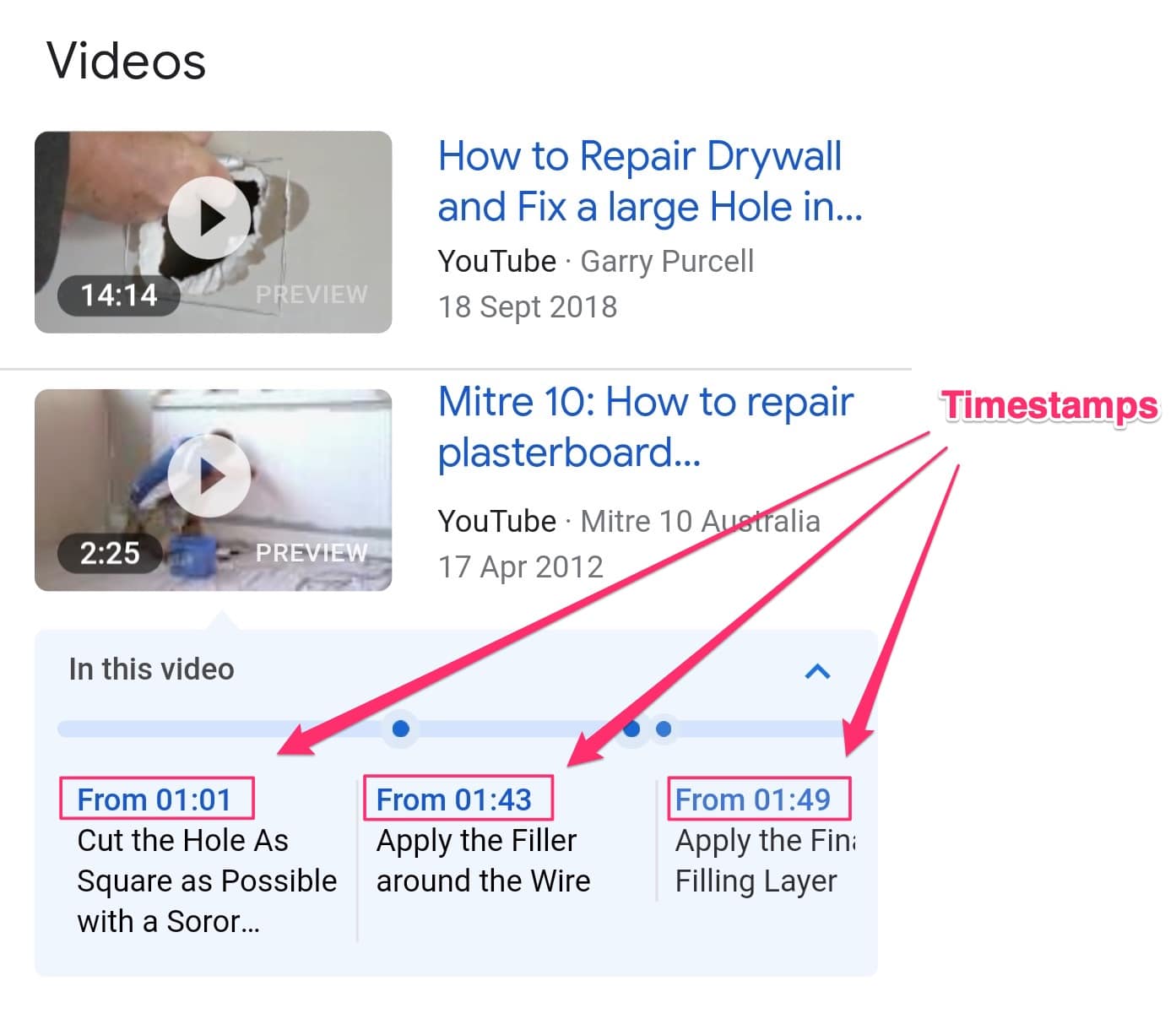
This move by Google to start pinpointing content within video is an extension of what Google has been doing with text.
With Google Passages, Google is indexing not just pages but passages within a web page. This allows Google to give the searcher the exact chunk of text that answers their query.
#3. How To Optimize For Podcast SEO
There are three key aspects to podcast SEO:
- targeting keywords
- adding metadata
- creating written content
Choosing podcast keywords
As with text-based content, the first thing you need to do in podcast SEO is choose keywords that people are searching for in Google.
The same keyword research techniques you would use for an article apply for a podcast as well:
- look for keywords that have low competition but reasonable monthly search volume. Remember that low competition keywords never have high monthly search volume (if they did they would be high competition keywords).
- make sure you understand the searcher intent behind the keyword (look at the search results in Google and you’ll quickly see what the searcher intent is for that keyword).
- use Google Auto Suggest to find topics (i.e. keyword phrases) that people are searching for on Google
Make sure to use use your keyword:
- throughout the content of your podcast
- in the title of your podcast episode
- in the description of your podcast (more about this in the section below)
Adding podcast metadata
In the same way that you fill in the title tag and meta description for a blog post in Yoast SEO, you need to add metadata for your podcast episode.
Whatever podcast host you choose, each host will have a form where you can specify a title, a description, tags, and other metadata about your podcast.
Here’s an example from the popular podcast platform Lisbyn:
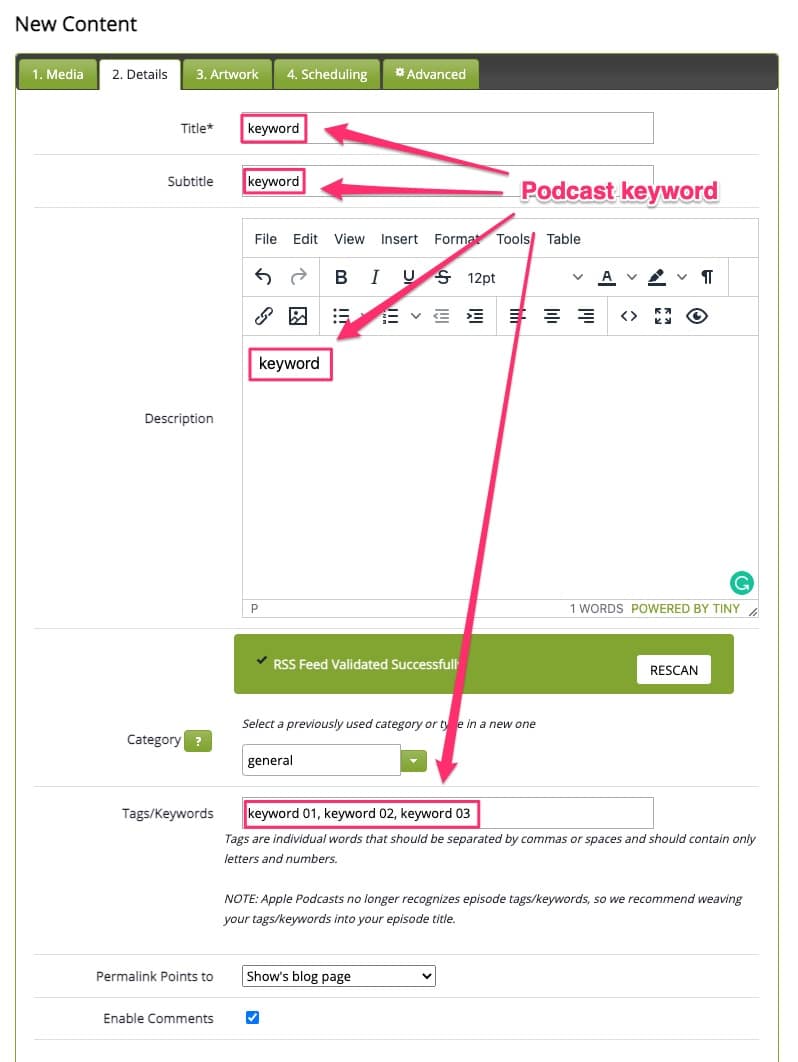
This metadata helps search engines understand what your podcast is about. And that helps them show your podcast to the people who are looking for that particular topic.
Creating podcast written content
An important part of podcast SEO is creating text-based content associated with your podcast.
As you know, organic search is primarily geared towards text-based content. So producing written content that is about your podcast and links to your podcast is a great way to improve your podcast SEO.
The written content for your podcast falls into two main categories:
- show notes
- transcripts
Show notes
Podcast ‘show notes’ are a written summary of what’s in the podcast. They help persuade the user that your podcast is worth listening to. Podcast show notes also contain links to products, resources, and people that are mentioned in the podcast. The resources that you link to in the show notes might include worksheets, checklists, and key takeaway summaries.
This all material that you can upload to a web page dedicated to a particular podcast episode.
The show notes can also contain chapters for your podcast.
Chapters are essentially a table of contents with timestamps. They allow listeners to jump around within your podcast to the content that most interests them.
There are various tools that allow you to add chapters to your podcast, such as:
These apps add ‘chapter markers’ to your audio file so that listeners can go straight to the sections of your podcast that interest them most.
While podcast chapters help your users, they’re also great for SEO because they give search engines text-based information about the content of your podcast.
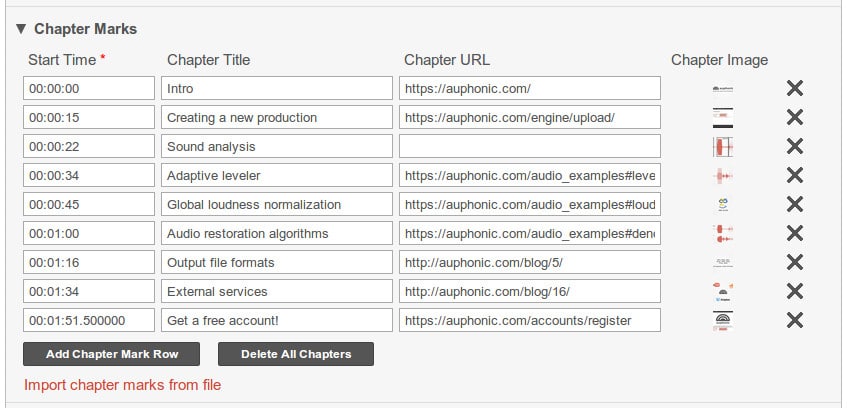
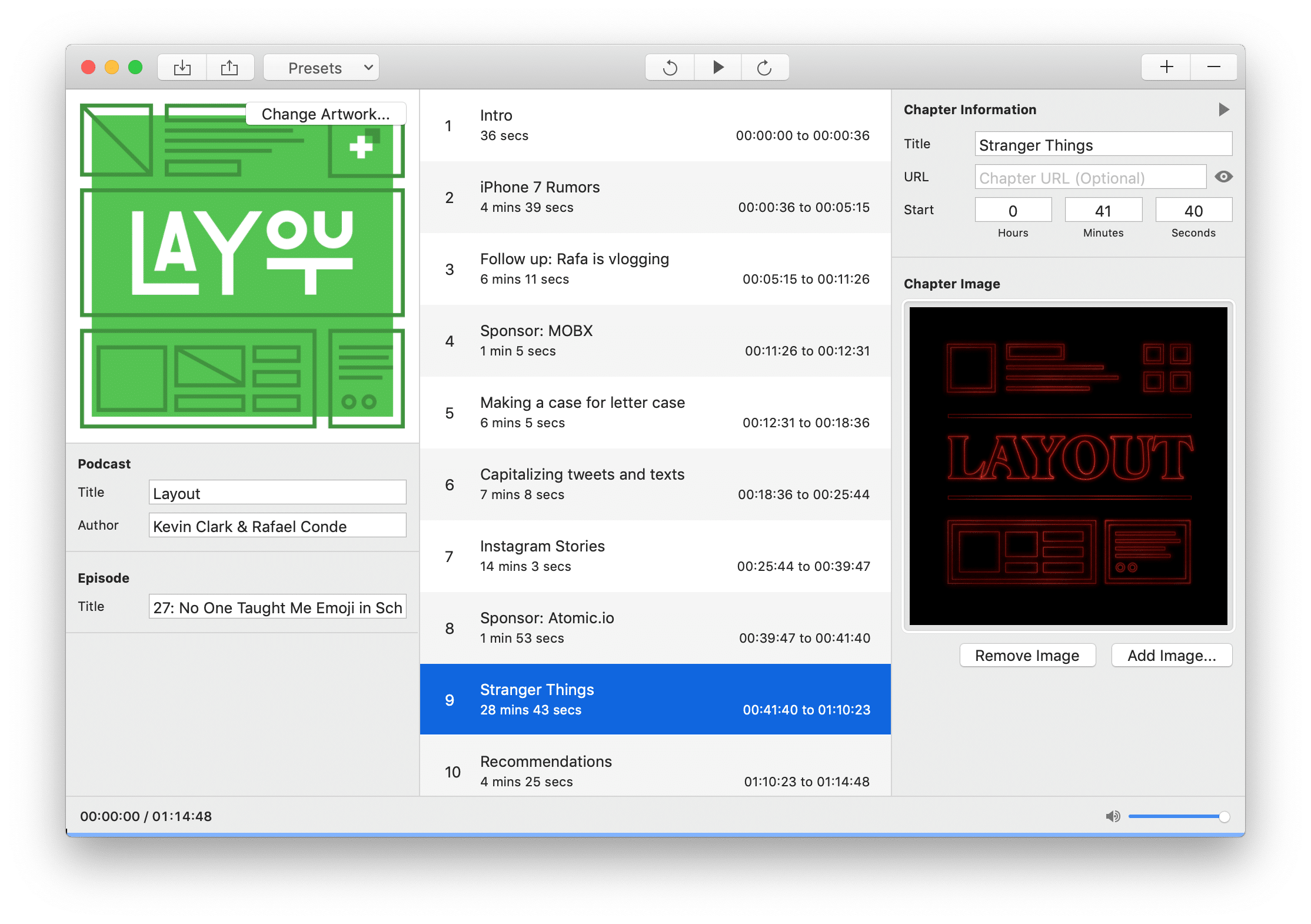
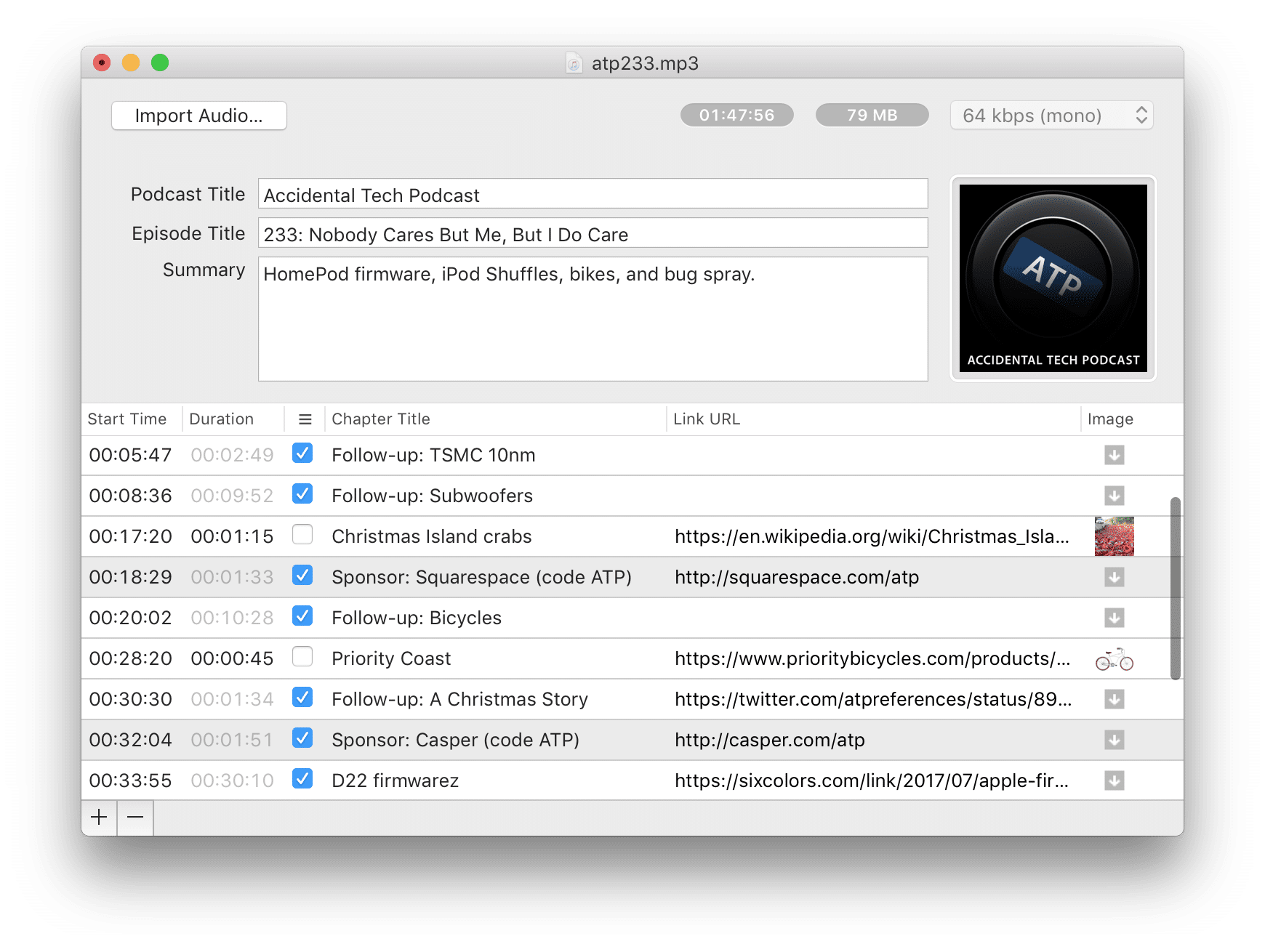
Transcripts
The other form of text content that can help your podcast SEO is a transcript.
A transcript is another piece of text-based content that you can upload to a web page devoted to a particular podcast episode. Again, it’s a great way of using text to increase the search engine visibility of your podcast.
So how do you create a transcript of your podcast?
You can use a DIY hack or you can use a paid service and get it done for you.
One DIY hack is to use the ‘Voice Typing’ feature in Google Docs.
Open up Google Chrome and go to Google Docs. Open a new document and then click on Tools and select Voice Typing from the drop-down menu. A microphone icon will appear. At the top of the microphone, select your language.
Then open whatever audio software you use and start playing the sound file for your podcast. As the Google Docs microphone picks up your voice, the text will appear on screen.
Another DIY method is to convert your audio file into the soundtrack of a video file, then upload it to YouTube and use YouTube’s closed captioning to get a transcript.
For more details on these two DIY methods, see this article by The Podcast Host.
Paid transcribing services use either humans or AI or a combination of both to produce 99% accurate transcripts of your podcasts.
There are many such services, including:
#4. Submit Your Show to the Major Podcast Platforms
Submitting your podcast episodes to the major podcasting platforms is another essential step in boosting your podcast SEO.
There are numerous podcast platforms but one in particular is key to improving your podcast SEO: Google Podcasts.
Google Podcasts
Making your podcast discoverable in Google Podcasts makes it much more likely that your podcast will show up in the search results.
Submitting your podcast episodes to Google Podcasts is not quite a simple as submitting to the other podcast platforms.
The Simplecast Help Center breaks the process down into these steps:
- Step 1: Add Show/Verify Ownership in Google Podcasts Manager
- Step 2: Check to See if Show is already Indexed by Google
- Step 3: Force Index or Publish Show on Google if not yet indexed
- Step 4: Generate a Direct Google Podcasts Link to Your Show after it is indexed
- Step 5: Add a Google Podcasts Listen & Subscribe Badge
Other major podcast platforms
There are well over 30 podcast platforms that will list your podcast episodes but here are the thirteen most important podcast directories:
- Apple Podcasts (formerly iTunes)
- Spotify
- Stitcher
- Podchaser
- TuneIn
- iHeartRadio
- Pandora
- Overcast
- Downcast
- PodCruncher
- Podcast Republic
- BeyondPod
- iCatcher
For useful tips on how to submit your podcasts to these platforms, check out this article by Castos.
#5. Other Podcast SEO Factors
Here are two more factors that will help improve your podcast SEO.
Ideal length for your podcast
We know that algorithms are constantly measuring user experience in text-based content. And if the algorithms aren’t already doing the same with audio content, we can be sure they will be pretty soon.
And that’s why it’s important for podcast SEO to get the right length for your podcast. Too short and you may not be providing enough ‘meat’ for your listeners to feel that they got anything worthwhile from your podcast.
Too long and your visitors will start dropping away before the end of the podcast – a bad signal for algorithms.
According to the podcasting platform Stitcher, the average listener stays connected to a podcast for 22 minutes. This is supported by the people behind TED talks: they limit TED talks to 18 minutes, as that’s the maximum length of time that a single presenter can hold an audience’s attention.
Developing a podcast voice
Your voice is key to holding the attention of your audience and it’s therefore a vital aspect of podcast SEO.
And that’s why it’s essential to use a good quality microphone. But you don’t need to break the bank to do this.
One of the most popular microphones amongst podcasters (and one that is used by Tim Ferris) is the Audio Technica ATR2100x-USB-Cardioid-Microphone priced at just $79.
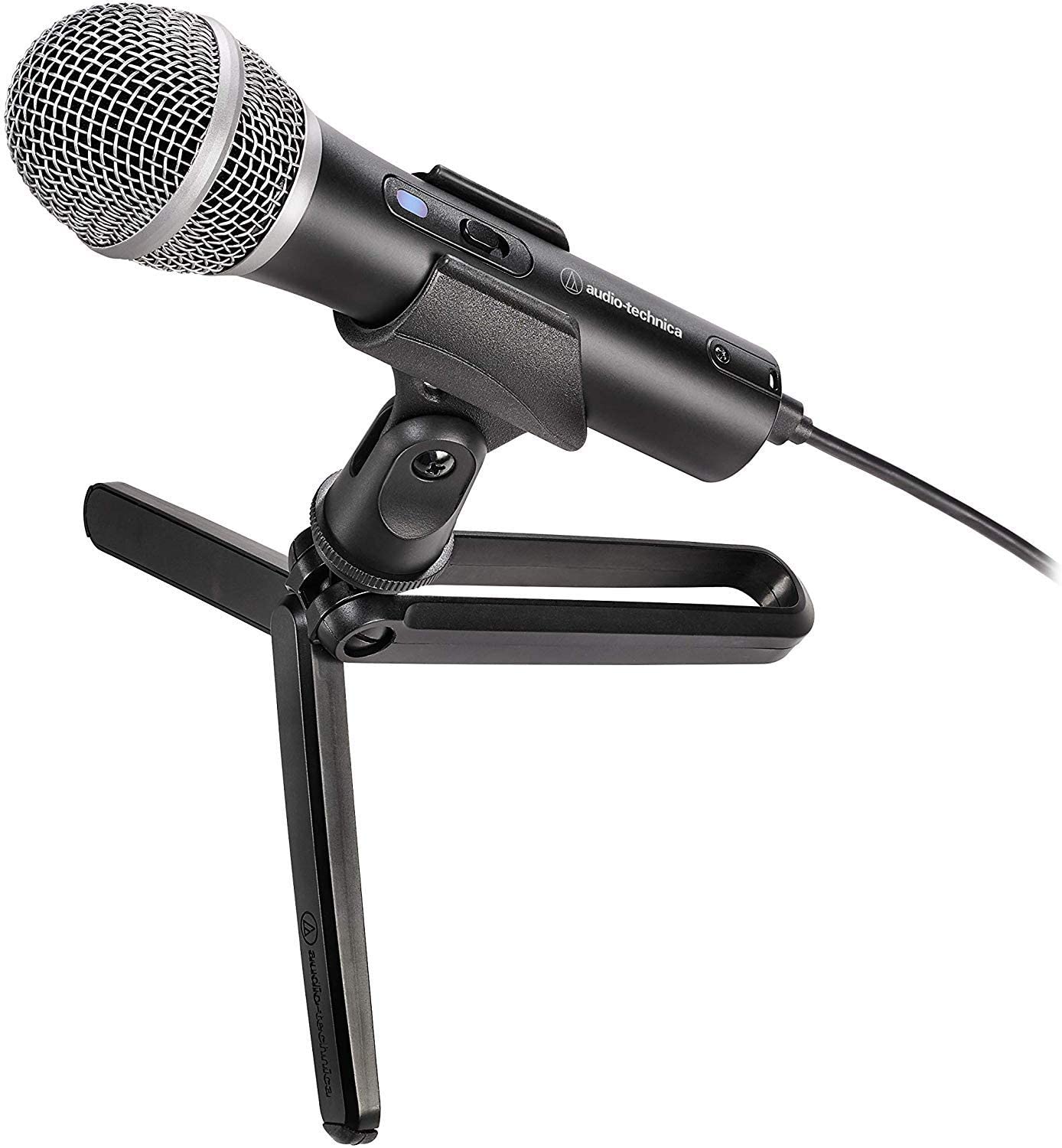
Here are some other tips for developing a good podcast voice:
- stand while you are recording – you’ll breathe more freely and so your speech will be clearer
- review your script before you start – you’ll speak more confidently if you have a good idea of where you’re going
- Describe what your page is about and highlight the benefit your page provides
- flick through a bullet-pointed PowerPoint presentation as you speak – it will help keep you on track and increase your confidence as you speak
- use a pop filter or pop shield to eliminate plosives (plosives are explosions of air that occur in English when you say words beginning with the letters p, t, k, b, d, g)
- make your voice rise and fall a little more than you normally would. This level of inflection helps keep your listeners’ attention (you should definitely avoid a flat monotone)
- have a glass of water nearby in case you get a dry throat
- smile while you are speaking – it will make your voice sound more friendly
- if you get tongue-tied while recording your podcast, just start the sentence again and cut out the ‘botched’ sentence in the editing
Conclusion
In 2019 Google started showing podcasts in the search results. With advances in AI and natural language processing (NLP), search engines will soon be able to pinpoint content in audio files and show it to searchers as time-stamped answers to their queries.
This means that podcasts are going to become an important source of organic search traffic. That presents a huge opportunity to podcasters.
So what are you waiting for – why not start turning your published articles into podcasts?
More Articles About SEO
- Search Engine Visibility – 23 Valuable Tips For More Traffic
- Stuck on Page #2 of Google – How To Get Out in 7 Easy Steps
- How To Rank for Multiple Keywords and Triple Your Traffic
- 13 Types of SEO You Shouldn’t Ignore in 2022
- Choosing a Domain Name for SEO – 10 Tips For Getting It Right
- SEO Recipe For Success – The 7 Key Ingredients For Ranking Well
- What Is SEO? An Introduction to Search Engine Optimization
- Seven Google SEO Trends To Watch For In 2020
- How To Write SEO Friendly Blog Posts – 17 Important Tips
- Topic Clusters & SEO – 5 Easy Tips For Building Content Hubs
- What Is Anchor Text (+ 7 Best Practices For Link Text)
- SEO Off-Page Techniques: 7 Important Facts You Need To Know
- SEO Acronym & What It Means (+ 7 Proven SEO Techniques)
- The Advantages of SEO – 13 Important Facts You Need To Know
- SEO for Blog Posts – 15 Factors To Help You Rank Higher
- HTTP vs HTTPS – 7 Facts You Need To Know For Better SEO
- 19 SEO Mistakes You Should Avoid At All Costs
- How to Reduce Server Response Time in WordPress (27 Tips)
- Bing Search Engine Stats – Some Interesting Facts & Figures
- The 9 Best Ways To Increase Your Domain Authority
- What Is Page Authority & What Does It Mean For SEO?
- Benefits of SEO for Bloggers – 10 Reasons You Need To Be On Page #1